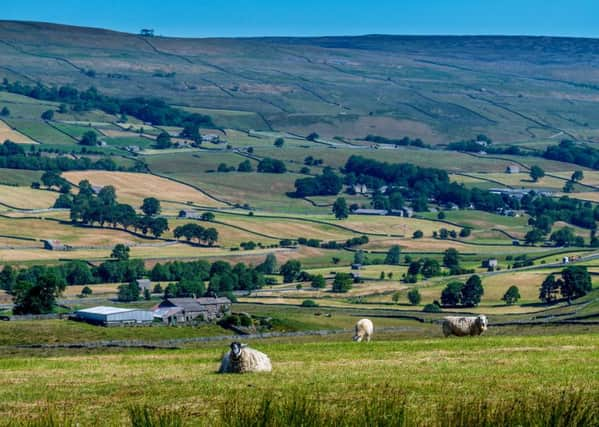Hilary McGrady: Farmers need support to nurture nature


We know one of the top three reasons for visiting Britain is for its landscape and culture. The National Trust alone welcomed more than 200 million people last year walking our coast, our woods and our land.
And when they come, they tell us that they love the imprint farming has left, from solid flower-rich Cornish hedges to the field barns along the valley floors in the Yorkshire Dales.
Advertisement
Hide AdAdvertisement
Hide AdThey also love to see Herdwick sheep or cattle grazing on hillsides and in pastures. But stats tell only part of the story. Think of the huge public response to the heart-breaking pictures we all saw on Blue Planet of turtles drowning in plastic, or the growing interest in food quality. Environmental issues matter to the wider public and we have a responsibility to listen to them.
So, where does that leave us?
We know our countryside can do so much more than simply provide food. Producing healthy, delicious food in a sustainable way will remain a huge priority. But our countryside’s products are more diverse and, as we look beyond 2020, there’s an increasing need – and demand – to dial up our focus on those additional product farms can produce, from those healthy fertile soils to the thrilling experiences of nature in all its forms.
We know that farmers need support. They will need financial support to deliver the public goods we describe, and crucially support to acquire new business skills. It will be a tough, competitive world but there will also be opportunities for land managers to benefit from new markets, for things like locking up carbon and providing cleaner water.
There are also big-ticket capital items that will be needed which will help us farm more competitively and efficiently, and which also do good for the environment; for example, trickle irrigators rather than water cannon to treat our soils more gently, or capital to change the size and position of all the gateways on a farm, reducing large machinery movements which compact soil and burn polluting diesel. These are small, practical things but make a huge difference.
Advertisement
Hide AdAdvertisement
Hide AdWe know this will cost. Research we carried out with the RSPB and Wildlife Trusts shows that £2.3bn is needed every year just to meet existing environmental objectives – let alone any “post-Brexit” environmental ambitions we might agree.
When you add in additional costs, we’ll need all of the £3.1bn a year currently spent under the Common Agricultural Policy and more, for the long term.
It is why we would like to see the promised Environment Bill put protections for nature solidly into statute. Rules may sound dull, but they are without doubt the best tools to ensure our wonderful landscapes and wildlife are protected; just look at the significantly cleaner beaches along our coastline, which have improved because of high legal standards and better monitoring. And what an opportunity to make the UK a leader in environmental quality – a country the rest of the world looks up to for standards and about which we can feel immense pride.
We also need a new, robust series of measures to ensure that governments in years to come deliver the environmental improvements people want – and are taken to task, if and when they don’t.
Advertisement
Hide AdAdvertisement
Hide AdAnd above all, we need to ensure that, with big changes happening in farming, we also focus on people. The Government and others need to help farmers adapt to these changes. A thriving farming sector gives us the best chance of succeeding at great land management. Equally, a fully planned but not agonisingly drawn out transition is crucial – let’s support farmers in making change and be generous where change may be difficult and painful.
We hold the countryside in trust for our children and grandchildren. Future generations will rightly hold us accountable if we don’t act now.
Hilary McGrady is director general of the National Trust, the country’s second largest landowner. She gave a keynote speech at Countryfile Live last week – this is an edited version.